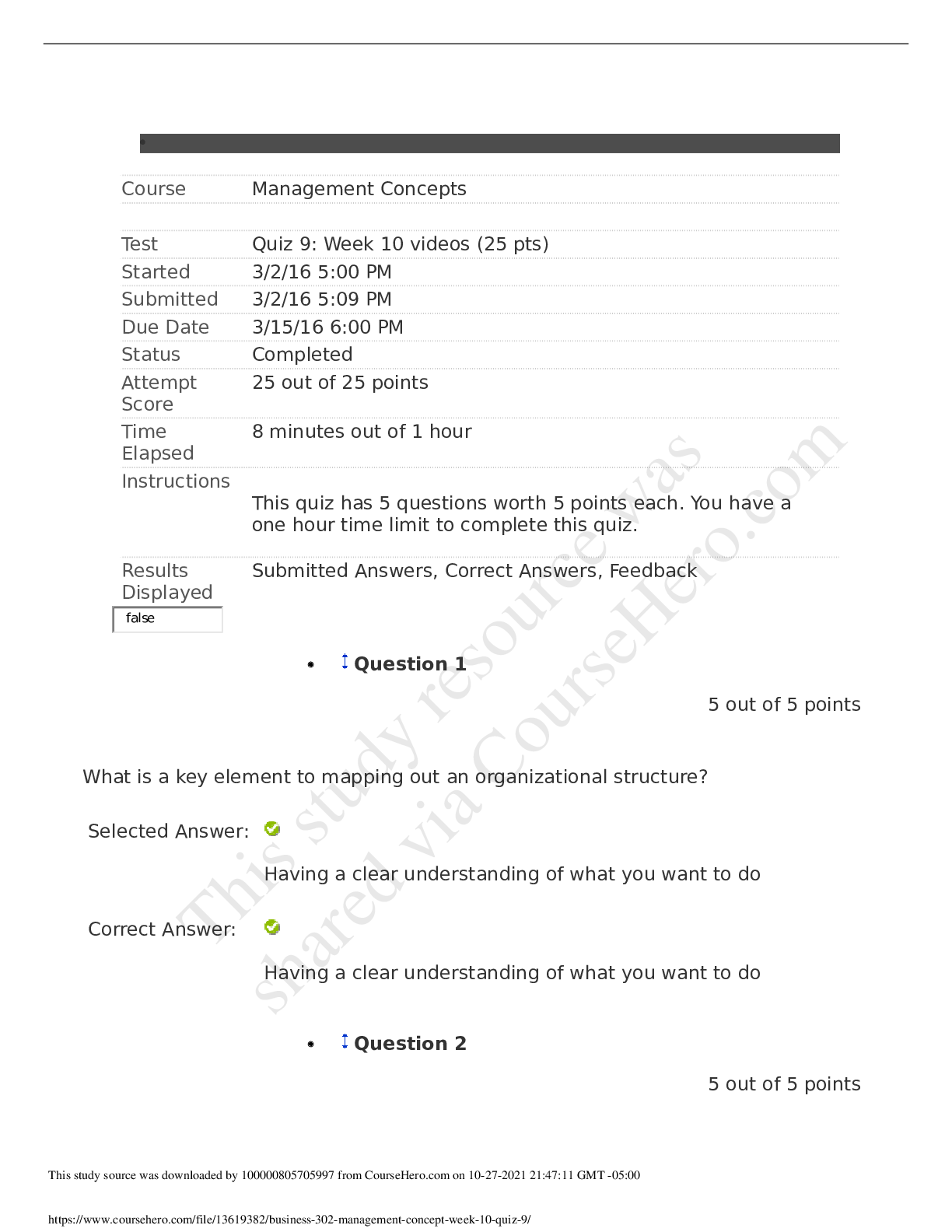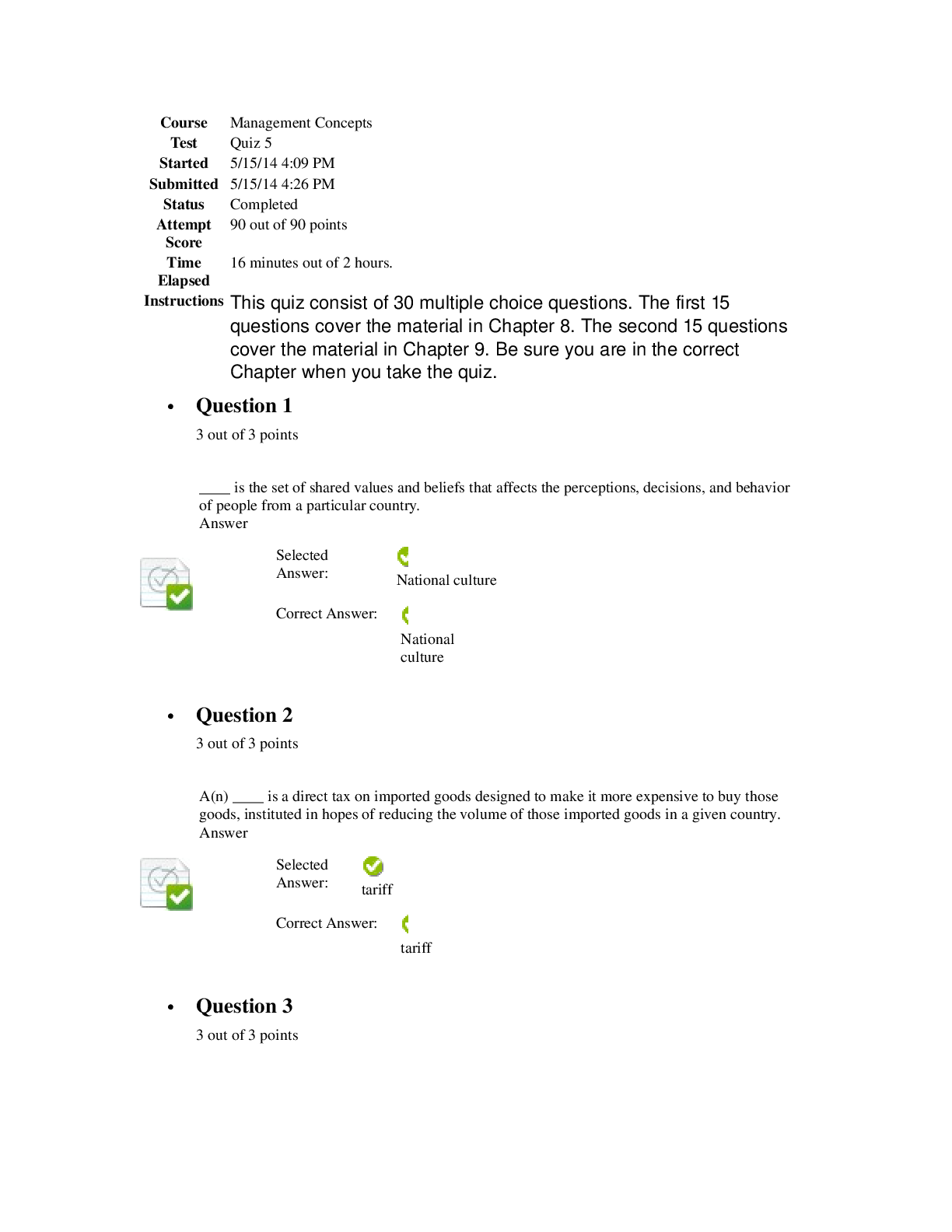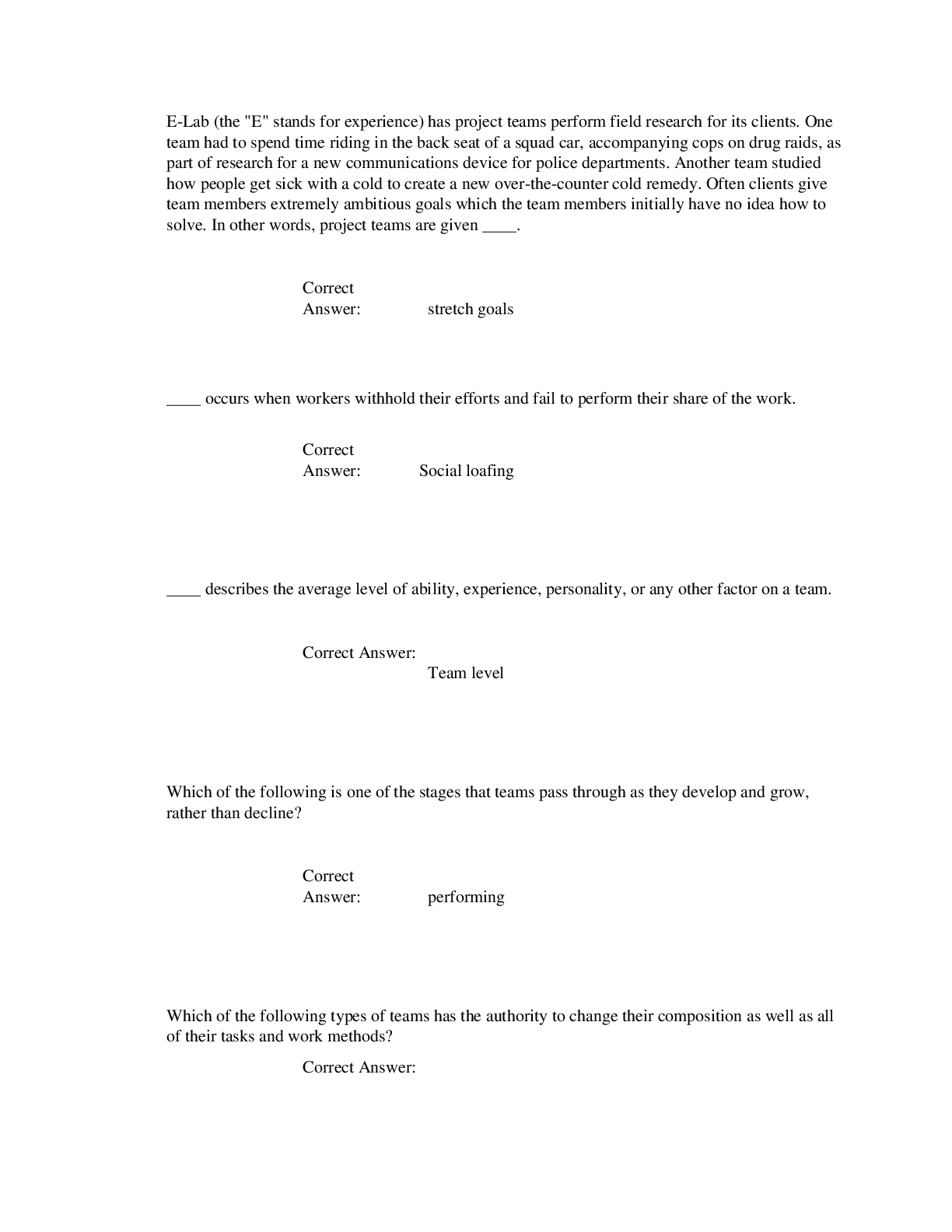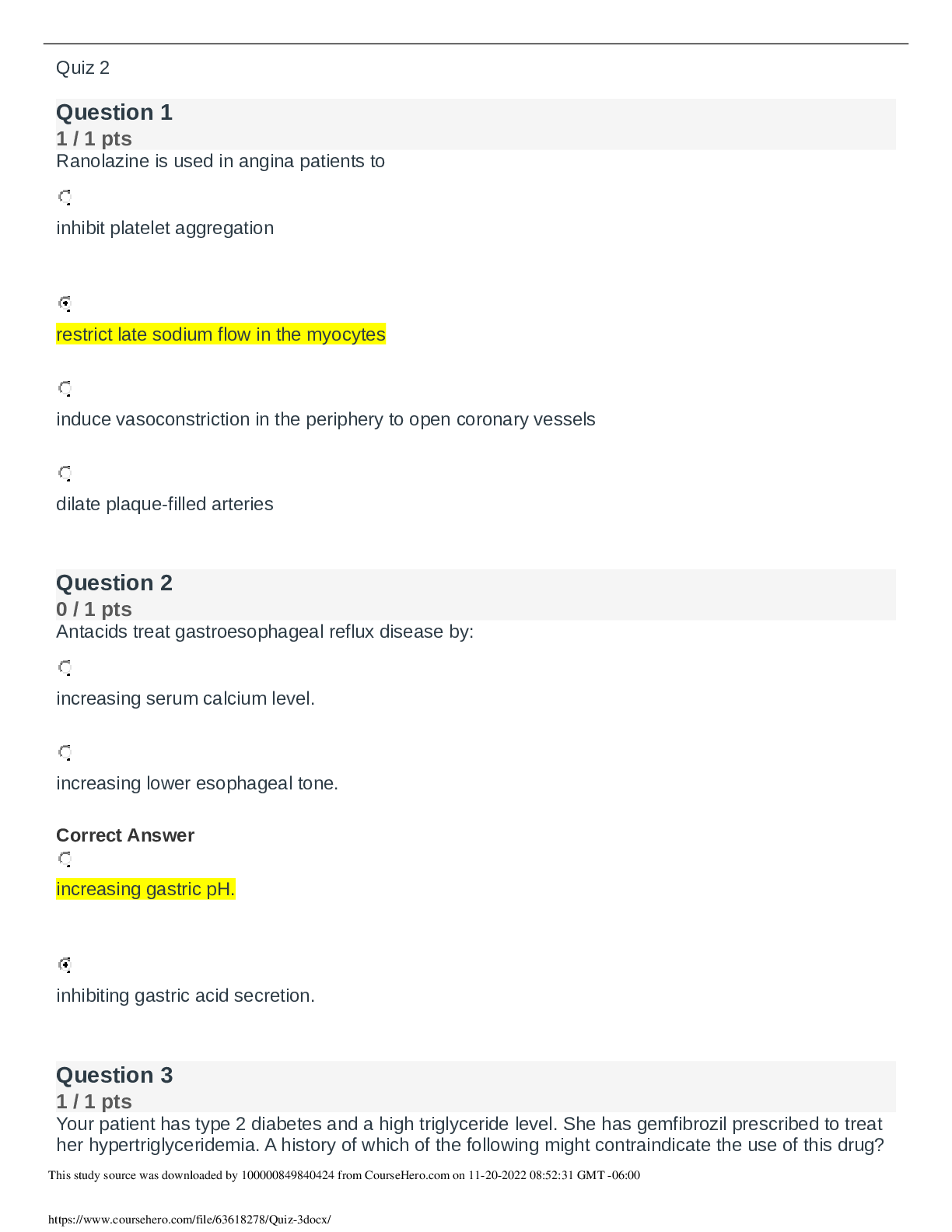Education > QUESTIONS & ANSWERS > Liberty University CSTU 101 Quiz 8 (All)
Liberty University CSTU 101 Quiz 8
Document Content and Description Below
Liberty University CSTU 101 Quiz 8 · 3 out of 3 points Whose sonnet, “The World Is Too Much with Us,” which mourns a world so overwhelmed with materialism that it may lose its spiri... tual qualities. Wordsworth · Question 2 3 out of 3 points For him, the way people made a living, their “means of production,” determined their beliefs and institutions. He based his worldview on the class struggle between the bourgeois vs the proletariat. Marx · Question 3 3 out of 3 points From the Essay, “The Future of Western Culture.” In the American Western culture, our coins describe three of the values that provide the foundation that holds American culture together, as well as unites us. You can think of these like a three-legged stool. If you remove any leg the stool will fall. Which of these is not one of the three? Freedom · Question 4 3 out of 3 points From the Essay, “The Future of Western Culture.” Which letters below signify-we are Roman and all of this is ours? SPQR · Question 5 3 out of 3 points The so called “War to end all Wars.” Great War · Question 6 3 out of 3 points Which Revolution was a major factor in the complex chain of events leading to the Great War? Industrial Revolution · Question 7 3 out of 3 points Whose quote is this? "Freedom is never more than one generation away from extinction. We didn't pass it on to our children in the bloodstream. It must be fought for, protected, and handed on for them to do the same." Reagan · Question 8 3 out of 3 points Which is these is not an American author? Shelley · Question 9 3 out of 3 points Our distance from past ages enables us to perceive the periods when a culture was balanced, when the balance tipped into chaos, when the adjustment began that leads to a new period of balance and so on. Culture-Epoch Theory · Question 10 3 out of 3 points The early 20th century could be described by which representative phrase? “Things fall apart” · Question 11 3 out of 3 points He believed in an all-encompassing Absolute, a world Spirit that expressed itself in the historical process. Basing his logic on the “triadic dialectic,” He stated that for every concept or force (thesis) there was its opposite idea (antithesis). He has a strong influence on Karl Marx. Lived from 1770-1831. Hegel · Question 12 3 out of 3 points What event in the early 1900’s was such a cataclysmic event that it ended a era of idealism and set the stage for the search for new values: chaos followed by a period of adjustment. World War 1 · Question 13 3 out of 3 points Perhaps more than any other period, the Romantic era was expressed as well in literature as in music and the visual arts. “Art,” wrote _____________, “is the most intense mode of individualism that the world has known.” Oscar Wilde · Question 14 3 out of 3 points Who helped set the initial stages of the Romanticism with his inspirational Social Contract. With the ringing proclamation: “Man is born free and everywhere he is in chains”. Rousseau · Question 15 3 out of 3 points The most representative poet of the mid-Victorian era, He reflected the mood of the period in poetry that was sad, quiet, contemplative, melancholy, sometimes wistful, and often pessimistic. The old optimism of the early Romantics had vanished. Tennyson · Question 16 3 out of 3 points From the Essay, “The Future of Western Culture.” Massive intellectual changes have shaped and reshaped our culture since the dawn of the Enlightenment. At the heart of this great intellectual shift is _______________. Secularism · Question 17 3 out of 3 points A belief system in contemporary culture characterized by the rejection of objective truth and global cultural narrative. Has influenced many cultural fields, including literary criticism, sociology, linguistics, architecture, visual arts, and music. Postmodernism · Question 18 3 out of 3 points In Chapter 21, we take a look at the 19th century. Which one of these is not one of the realities of this century in Western culture? Progress of Christianity · Question 19 3 out of 3 points Who wrote these words from his famous work Don Juan? He was the epitome of the Romantic Hero. “I want a hero: an uncommon want, . . . But can’t find any in the present age Fit for my poem (that is, for my new one): So, as I said, I’ll take my friend Don Juan.” Lord Byron · Question 20 3 out of 3 points He was an atheistic existentialist quite unlike Nietzsche, and arrived at his conclusions using logic. He contended that the idea of God was self-contradictory, that the man called Christ could not be both divine and human because the terms are mutually exclusive. Lived from 1905-1980. Sartre · Question 21 2 out of 2 points There was a general calm over Europe with no revolutions from 1830-1848. False · Question 22 2 out of 2 points Matthew Arnold’s poem “Dover Beach” illustrates his love of puritanism during the late 19th century. False · Question 23 2 out of 2 points In many ways, the modern environmental movement could be traced back to the romantic veneration of nature. True · Question 24 2 out of 2 points The nineteenth century was noted for the prosperity stimulated by the industrial revolution, the growing middle class, and the enormous increase in manufactured products. True · Question 25 2 out of 2 points The most powerful moving force behind the Civil Rights Movement of the 60’s was Jessie Jackson, the president of the Southern Christian Leadership Conference. False · Question 26 2 out of 2 points Existentialism owes its popularity in no small part to repeated failures in politics, economics, and social organizations that have scarred our century. True · Question 27 2 out of 2 points Existentialism was a philosophical movement that was formulated during the Second World War. True · Question 28 2 out of 2 points People's religious views will determine the direction of their individual lives and of their society. True · Question 29 2 out of 2 points Impressionists saw themselves as the ultimate realists whose main concern was the perception of optical sensations of light and color. True · Question 30 2 out of 2 points Paris hosted the Great Exhibition of 1851. False [Show More]
Last updated: 1 year ago
Preview 1 out of 7 pages
Instant download
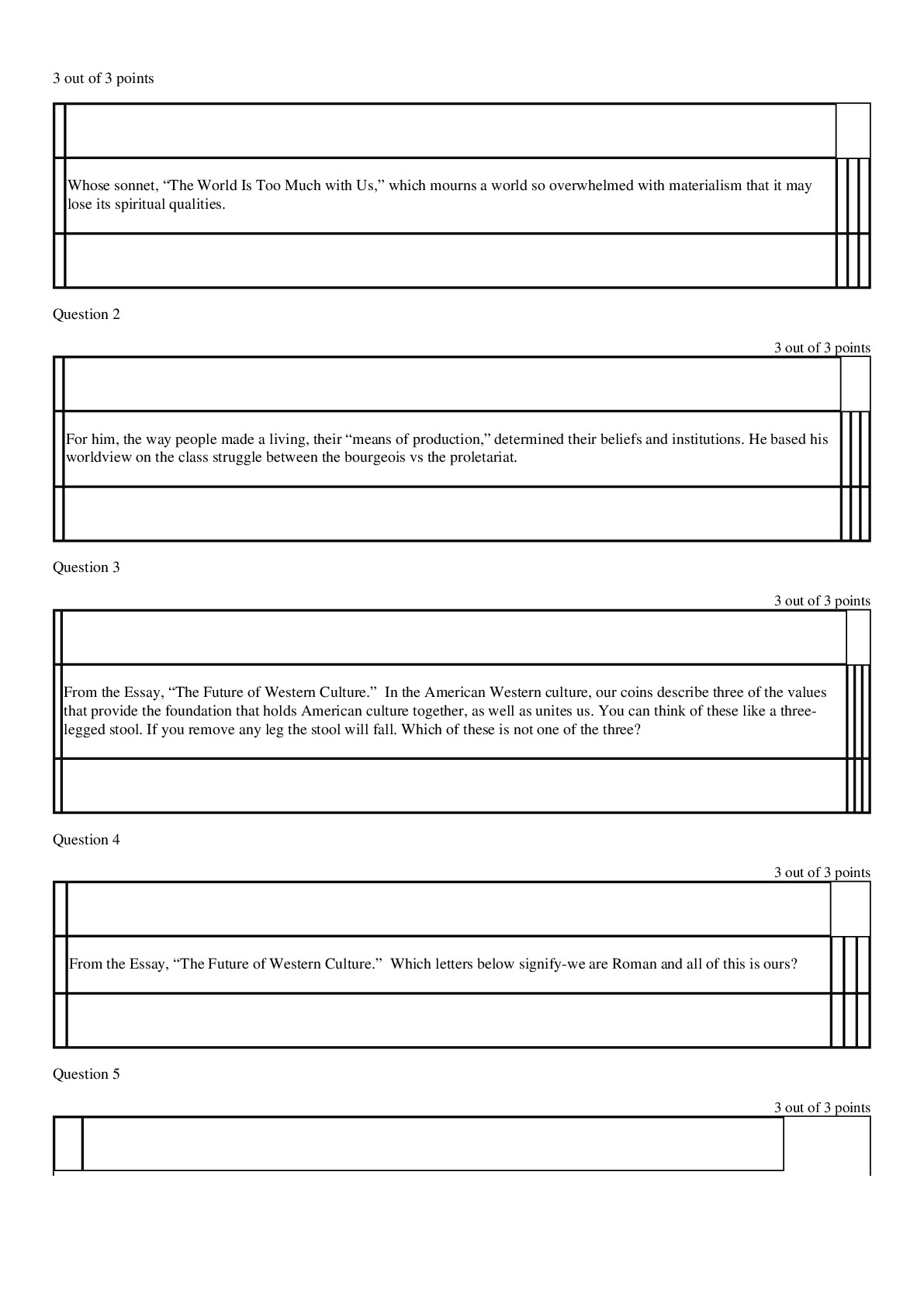
Buy this document to get the full access instantly
Instant Download Access after purchase
Add to cartInstant download
Reviews( 0 )
Document information
Connected school, study & course
About the document
Uploaded On
Nov 02, 2020
Number of pages
7
Written in
Additional information
This document has been written for:
Uploaded
Nov 02, 2020
Downloads
0
Views
49



